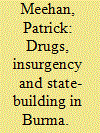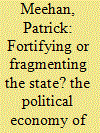| Srl | Item |
| 1 |
ID:
106875


|
|
|
|
|
| Publication |
2011.
|
| Summary/Abstract |
The mainstream discourse on the political economy of drugs has emphasised the negative correlation between drug production and state capacity, with the presence of a thriving drugs trade seen as both a sign and a cause of weak states. Through an analysis of the drugs trade in Burma this study argues that such an approach is deeply flawed. Focusing on the period since the 1988 protests it argues that the illicit nature of the drugs trade has provided the state with an array of incentives (legal impunity, protection, money laundering) and threats (of prosecution) with which to co-opt and coerce insurgent groups over which it has otherwise commanded little authority. Although the state's involvement in the drugs trade was initially driven by an expedient desire to co-opt insurgent groups following the 1988 protests, this study also argues that over time it has provided an arena in which more immanent and largely unanticipated processes of state formation, namely the centralisation of the means of violence and extraction, have gradually been built. Rather than being a sign of corruption-induced state incapacity, the state's involvement in the drugs trade has thus become a central arena through which state power has been constructed and reproduced.
|
|
|
|
|
|
|
|
|
|
|
|
|
|
|
|
| 2 |
ID:
139438


|
|
|
|
|
| Summary/Abstract |
Over the past twenty-five years, the government of Myanmar (Burma) has consolidated control over large parts of Shan State, neutralizing much of the threat posed by armed groups and strengthening its hold over revenue extraction. During this period Myanmar has retained its position as the world's second largest producer of illicit opium, much of which is converted into heroin within the country's borders. This article explores the relationship between state-building processes and the illicit opium/heroin economy in Shan State since 1988. The author has four aims. First, to reassess the theoretical assumptions that equate illicit economies with state fragility and demonstrate instead why illicit drug economies can become embedded in processes of conflict reduction and state consolidation. Second, to explain why establishing control over Shan State has become so important to the Myanmar government's state-building ambitions. Third, to analyze how the state's engagement with the drug trade has become a vital part of its attempts to consolidate control, in terms of financing military expansion and brokering deals with strongmen who are able to govern local populations. Finally, to assess how these strategies embody a form of “negotiated statehood” in which the state's growing control has been defined by attempts to manage, rather than monopolize, the means of coercion and extraction.
|
|
|
|
|
|
|
|
|
|
|
|
|
|
|
|